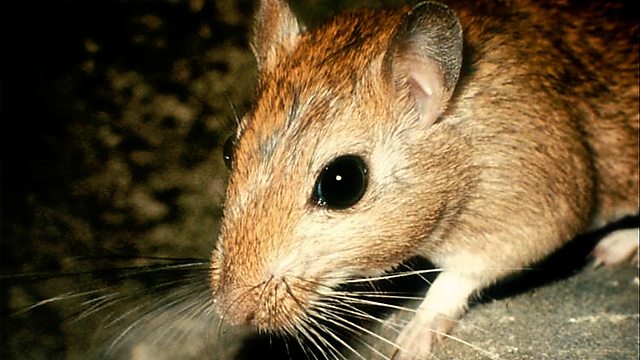Plague in the Great Gerbils of Kazakhstan - Eternity and the Earth After Us
Quentin Cooper is joined by infectious diseases expert Michael Begon to discuss the transmission of plague through gerbil populations, particularly those in Kazakhstan.
Plague in the Great Gerbils of Kazakhstan
The underground world of Kazakhstan's great gerbils harbours a deadly secret: the bubonic plague. Instead of dying out with the Great Fire, the Black Death continues to thrive in groups of wild animals across Africa, Asia and the Americas.
Clues to how it spreads come from the coffee percolator! The mathematical 'percolation' theory describes how substances move through the gaps between something like coffee grounds, and can be applied to the spread of plague through a population. With the risk of cross-transmission and the apparent rise in human deaths from the plague, scientists need to find ways of controlling it.
Infectious disease expert Mike Begon from the University of Liverpool joins Quentin Cooper to discuss the unique transmission of the disease through gerbil populations, and how work on an early warning system could help prevent future outbreaks in both wildlife and humans.
To look at the wider implications of wildlife disease, animal epidemiologist Andrew Cunningham from the Zoological Society of London explains how plague and other illnesses can drive species to extinction. He also discusses how controlling global trade and crates of bananas could help stop wildlife diseases in their tracks.
Eternity and the Earth After Us
When it comes to global change and the future of the Human species, weβre getting used to tales of gloom and doom. Time to cheer up, says science writer Michael Hanlon. In his new book βEternity our next billion yearsβ he argues that, though the road ahead may be rocky, our descendents will survive and even flourish for many millennia. He's not suggesting that everything will go smoothly.
There may be famines and epidemics, earthquakes and volcanoes, floods and wars. But, he argues, though millions may die, our species will come through. He certainly doesn't agree that this could be our final century.
We may even learn to deflect asteroids of the sort that may have killed the dinosaurs. Other cosmological cataclysms such as a nearby exploding star or a passing black hole have not affected Earth in its 4.5 billion year history so are unlikely now, he suggests.
As a geologist at Leicester University, Jan Zalasiewicz also takes a long perspective. But he has seen many species come and go in the fossil record and imagines a similar fate for humans. In his own book, βThe Earth After Usβ he describes the legacy that will be left in the rocks by human civilisation, as it might be revealed by alien geologists after a hundred million years.
Both guests speculate on the even longer term: if our descendants still survive, what will they have evolved into? Will they be masters of the Galaxy? What will happen to Earth when the sun finally runs out of fuel and swells into a red giant? What will be our physical legacy in trillions of years time when even the protons of normal atoms have decayed?
Last on
More episodes
Broadcast
- Thu 11 Dec 2008 16:30ΒιΆΉΤΌΕΔ Radio 4
Featured in...
![]()
Pests and Vermin
When does something small and furry stop being cute and start being vermin?



